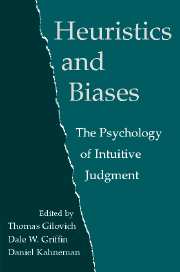Book contents
- Frontmatter
- Contents
- List of Contributors
- Preface
- Introduction – Heuristics and Biases: Then and Now
- PART ONE THEORETICAL AND EMPIRICAL EXTENSIONS
- PART TWO NEW THEORETICAL DIRECTIONS
- 22 Two Systems of Reasoning
- 23 The Affect Heuristic
- 24 Individual Differences in Reasoning: Implications for the Rationality Debate?
- 25 Support Theory: A Nonextensional Representation of Subjective Probability
- 26 Unpacking, Repacking, and Anchoring: Advances in Support Theory
- 27 Remarks on Support Theory: Recent Advances and Future Directions
- 28 The Use of Statistical Heuristics in Everyday Inductive Reasoning
- 29 Feelings as Information: Moods Influence Judgments and Processing Strategies
- 30 Automated Choice Heuristics
- 31 How Good Are Fast and Frugal Heuristics?
- 32 Intuitive Politicians, Theologians, and Prosecutors: Exploring the Empirical Implications of Deviant Functionalist Metaphors
- PART THREE REAL-WORLD APPLICATIONS
- References
- Index
25 - Support Theory: A Nonextensional Representation of Subjective Probability
from PART TWO - NEW THEORETICAL DIRECTIONS
Published online by Cambridge University Press: 05 June 2012
- Frontmatter
- Contents
- List of Contributors
- Preface
- Introduction – Heuristics and Biases: Then and Now
- PART ONE THEORETICAL AND EMPIRICAL EXTENSIONS
- PART TWO NEW THEORETICAL DIRECTIONS
- 22 Two Systems of Reasoning
- 23 The Affect Heuristic
- 24 Individual Differences in Reasoning: Implications for the Rationality Debate?
- 25 Support Theory: A Nonextensional Representation of Subjective Probability
- 26 Unpacking, Repacking, and Anchoring: Advances in Support Theory
- 27 Remarks on Support Theory: Recent Advances and Future Directions
- 28 The Use of Statistical Heuristics in Everyday Inductive Reasoning
- 29 Feelings as Information: Moods Influence Judgments and Processing Strategies
- 30 Automated Choice Heuristics
- 31 How Good Are Fast and Frugal Heuristics?
- 32 Intuitive Politicians, Theologians, and Prosecutors: Exploring the Empirical Implications of Deviant Functionalist Metaphors
- PART THREE REAL-WORLD APPLICATIONS
- References
- Index
Summary
Both laypeople and experts are often called upon to evaluate the probability of uncertain events such as the outcome of a trial, the result of a medical operation, the success of a business venture, or the winner of a football game. Such assessments play an important role in deciding, respectively, whether to go to court, undergo surgery, invest in the venture, or bet on the home team. Uncertainty is usually expressed in verbal terms (e.g., unlikely or probable), but numeric estimates are also common. Weather forecasters, for example, often report the probability of rain (Murphy, 1985), and economists are sometimes required to estimate the chances of recession (Zarnowitz, 1985). The theoretical and practical significance of subjective probability has inspired psychologists, philosophers, and statisticians to investigate this notion from both descriptive and prescriptive standpoints.
Indeed, the question of whether degree of belief can, or should be, represented by the calculus of chance has been the focus of a long and lively debate. In contrast to the Bayesian school, which represents degree of belief by an additive probability measure, there are many skeptics who question the possibility and the wisdom of quantifying subjective uncertainty and are reluctant to apply the laws of chance to the analysis of belief. Besides the Bayesians and the skeptics, there is a growing literature on what might be called revisionist models of subjective probability.
- Type
- Chapter
- Information
- Heuristics and BiasesThe Psychology of Intuitive Judgment, pp. 441 - 473Publisher: Cambridge University PressPrint publication year: 2002
- 4
- Cited by

